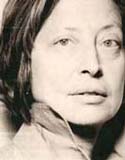
Patrizia Cavalli
- Italy
- Zu Gast beim ilb: 2007
Patrizia Cavalli was born in Todi, Umbria. In 1968 she moved to Rome where she studied philosophy, graduating with a dissertation on the aesthetics of music. She was supported in her poetry, to which she applied herself only occasionally and hesitantly, by Elsa Morante, one of the most important figures in Italian post-war literature: »At a certain point in my life a person that I trusted told me that I was a poet. And I believed her.«
Cavalli’s poetry is characterised by musicality and the artful intertwining of contrasts, alongside a manner of ex pr ession that is both reserved and strongly subjective. In the opening poem of her first volume which gives its name to the title »Le mie poesie non cambieranno il mondo« (1974; t: My poems will not change the world) she deals with her role as a poet in a way that is at once self-conscious, defiant and ironic. The lyrical subject formulates inner perspectives and worlds of feeling through clear language often with epigrammic brevity, using intertextual references, classical poetic forms and colloquial set phrases, which captivate by combining passion and coolness. Stylistic devices such as rhyme, internal rhyme and enjambement ensure a melodic quality achieved through sound and rhythm. Cavalli’s first volume of poems was re-published with her next work »Il cielo« (1981; t: The sky) and the collection »L’io singolare pr o pr io mio« (t: The singular I just mine) in »Poesie 1974-1992« (1992; t: Poems 1974-1992). Giorgio Agamben writes in the pr eface to the Italian/French edition: »A pr osody that is incredibly rich in caesuras and staccato effects, a resolutely hypotactical structuring of discourse is ex pr essed – one knows not how – in the most fluent, seamless and colloquial language in Italian poetry of the 20th century. In Patrizia Cavalli’s poetic language hymns and elegies merge with one another restlessly.«
Subsequent to »Sem pr e aperto teatro« (1999; t: Theatre always open), for which she was awarded the Premio Viareggio Repaci, one of the most pr estigious Italian literary pr izes, »La Guardiana« (2005; t: The overseer) was published as well as, most recently, »Pigre divinità e pigra sorte« (2006; t: Lazy gods and lazy fate), for which Cavalli received the Premio Internazionale Pasolini. This collection of poems deals, for the first time through greater abstraction and distance, with the reasons and conditions that underlie emotional states.
Apart from poetry, Cavalli has written two radio plays for national radio (RAI) and has translated, among other works, Shakespeare’s »A Midsummer Night’s Dream« and »The Tempest«, Wilde’s »Salome« and Molière’s »Amphitryon«. The writer lives in Rome.
© international literature festival berlin
Le mie poesie non cambieranno il mondo
Einaudi
Turin, 1974
Il cielo
Einaudi
Turin, 1981
Recull
La Forest d’Arana
València, 1987
Poesie 1974-1992
Einaudi
Turin, 1992
My Poems Will Not Change the World
Exile Editions
Toronto, 1998
[Hg. Barry Callaghan, Francesca Valente]
Sempre aperto teatro
Einaudi
Turin, 1999
La Guardiana
Nottetempo
Rom, 2005
Pigre divinità e pigra sorte
Einaudi
Turin, 2006
Übersetzer: Alessandro Anghinoni, Ilona L. Kensy, Maja Pflug, Piero Salabè, Iris Väth
